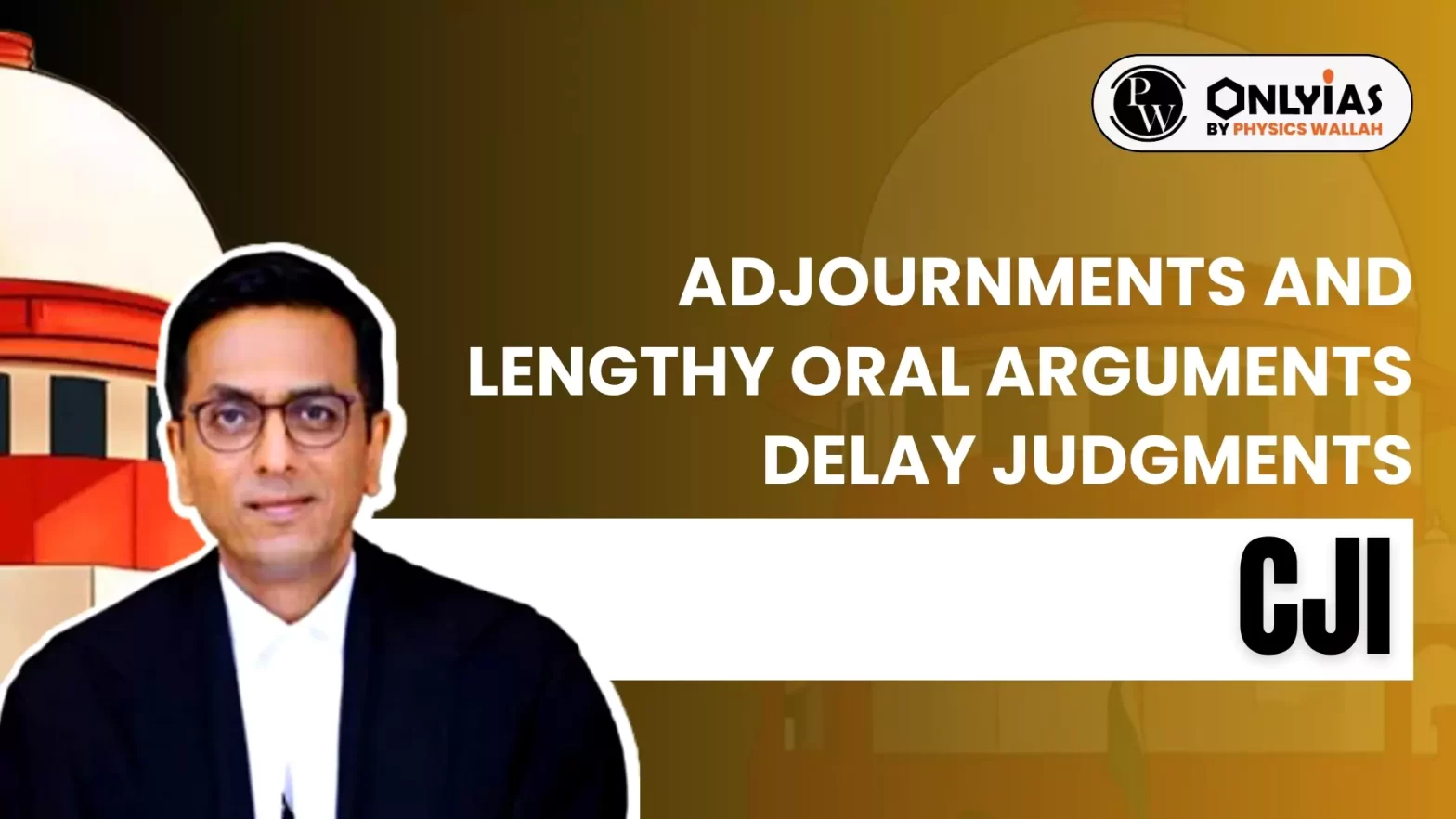Context:
This editorial is based on the news “The four issues that CJI DY Chandrachud highlighted within the legal profession” which was published in the Indian Express. Recently, delivering the Foundation Day address on the 75th Anniversary of Supreme Court, the Chief Justice of India highlighted four issues within the judiciary that will have to be addressed through “difficult conversations”.
Adjournment Culture Among Lawyers
- Adjournment: It refers to the court practice of delaying a scheduled hearing to a later date.
- Order XVII of the Civil Procedure Code, 1908: It states that courts shall not grant an adjournment to a party more than three times during the hearing of a suit, that sufficient cause must be shown and that the circumstances are beyond the control of the party.
- Concern: While adjournments are often necessary, the delay caused has a cascading effect of increasing the number of pending cases.
- The 239th Law Commission Report (2012): It mentioned that heavy workload in the courts is taken advantage of by the advocates to press for adjournments.
- This presents a vicious cycle where adjournments lead to heavier workloads, which lead to even more adjournments.
On the Length of Oral Arguments In Court
- To Ensure Efficiency: The court will direct the parties to confer and create a time schedule for oral arguments to ensure efficiency and arguments are not repeated by lawyers.
- Actions by CJI: In January 2019, then CJI Ranjan Gogoi directed the parties to draw up a time schedule for the hearings due to the vast number of parties and lawyers.
- In the case of the challenge against EWS reservation, the Constitution Bench led by CJI Chandrachud directed the lawyers to create a time schedule and the hearings were completed in 8 days.
- May Practice: The Supreme Court of the United States instructed lawyers to strictly limit their arguments to 30 minutes a side. It was considered in the 99th Law Commission Report (1984).
- The 230th Law Commission Report, 2009: It suggested limiting oral arguments to one-and-a-half hours, unless the case involved constitutional interpretation or a complex question of law.
On Long Court Vacations
- An Inconvenient Colonial Legacy: The 133rd report of the Parliamentary Standing Committee on Personnel, Public Grievances, Law and Justice suggested that High Court judges need to reduce vacation to tackle the mounting pendency of cases.
- The report stated that it is a colonial legacy that causes deep inconvenience to litigants.
- Flexi-time for Lawyers and Judges: This is a practice where employees are allowed to choose their daily working hours so long as they work for a set total number of hours in a given period.
- A similar arrangement was introduced in 2022 for employees and Judges working at the Metropolitan and Regional trial courts in the Philippines.
- The Ministry of Law and Justice in 2011: It found that High Courts function for 210 days in a year and requested all HCs to ensure that the number of working days was increased to 222.
- The Malimath Committee Report, 2003: It recommended an increase in working days at the SC by three weeks. By considering the recommendation, in 2014, the SC notified the new rules which state that summer vacation shall not exceed seven weeks (reduced from 10 weeks).
A Level Playing Field For First Generation Lawyers
- A Step towards Inclusivity: For first generation lawyers and those from marginalised segments who have the “will to work” and “potential to succeed”.
- A Satisfying Example: 36.3% of the judges in district courts, over 50% of candidates selected in the recruitment exam for junior civil judges and 41% of law clerk candidates at the Supreme Court were women.
- Actions Taken: The Supreme Court Advocates-on-Record Association (SCAORA) efforts to facilitate more diversity in the legal profession includes providing better facilities for women lawyers, giving more “weightage” to first-generation lawyers when designating Senior Advocates, and allowing lawyers to appear via video conference on all working days.
Conclusion
The 75th year since the founding of the SC provided an opportunity to meet the challenges and step into the future with an honest assessment of India’s progress. The Indian Judiciary needs to renew the pledge to uphold the Constitution within and beyond the courtrooms.
Also Read: Interim Budget 2024-2025
![]() 5 Feb 2024
5 Feb 2024

